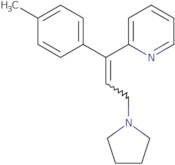
Produktinformation
- 2-[(1E)-1-(4-Methylphenyl)-3-(1-pyrrolidinyl)-1-propen-1-yl]pyridine
- Pyridine, 2-[(1E)-1-(4-methylphenyl)-3-(1-pyrrolidinyl)-1-propen-1-yl]-
- Pyridine, 2-[1-(4-methylphenyl)-3-(1-pyrrolidinyl)-1-propenyl]-, (E)-
- Pyridine, 2-[3-(1-pyrrolidinyl)-1-p-tolylpropenyl]-, (E)-
- Trans-1-(4'-methylphenyl)-1-(2''-pyridyl)-3-pyrrolidino-1-propene
- Tripolidina
- Triprolidin
- Triprolidine
- Tripyrolidine
- trans-1-(2-Pyridyl)-3-pyrrolidino-1-p-tolylprop-1-ene
- Mehr Synonyme anzeigen
- trans-1-(4-Methylphenyl)-1-(2-pyridyl)-3-pyrrolidinoprop-1-ene
- trans-2-[3-(1-Pyrrolidinyl)-1-p-tolypropenyl]pyridine
Actidil is a drug that inhibits histamine release from mast cells and basophils, which are cells responsible for allergic reactions. Actidil prevents the release of inflammatory mediators, such as histamine, leukotrienes, and prostaglandins. Actidil has been shown to inhibit polymerase chain reaction (PCR) in experimental models. This drug is used mainly to treat bowel diseases, such as ulcerative colitis and Crohn’s disease. It can also be used for the treatment of liver lesions caused by cytostatic drugs. Actidil has been tested in humans with other diseases as well, including asthma and rhinitis. The most common side effects are headache, dizziness, drowsiness, dry mouth or throat, constipation or diarrhea, nausea or vomiting.
Chemische Eigenschaften
Technische Anfrage zu: 3D-AAA48612 Actidil
Wenn Sie ein Angebot anfordern oder eine Bestellung aufgeben möchten, legen Sie stattdessen die gewünschten Produkte in Ihren Warenkorb und fordern Sie dann ein Angebot oder eine Bestellung an aus dem Warenkorb. Es ist schneller, billiger und Sie können von den verfügbaren Rabatten und anderen Vorteilen profitieren.





